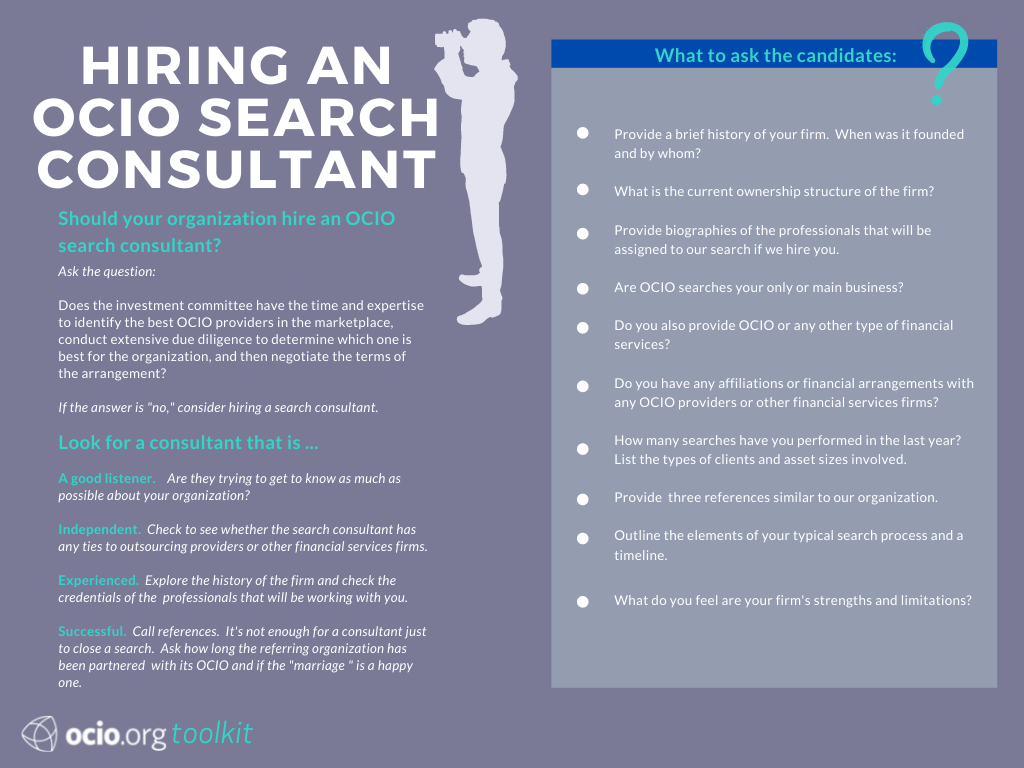Search Consultant vs. DIY

An OCIO search consultant is like a matchmaker that arranges marriages between organizations and OCIOs. The decision whether to use a specialized search consultant can be made by answering the following question:
Does the investment committee have the time and expertise to identify the best OCIO providers in the marketplace, conduct extensive due diligence to determine which one is right for the organization, and then negotiate the terms of the arrangement?
If so, then an institution-led search may be appropriate. If not, then the cost of a good OCIO search consultant easily could be worth the time saved and the increased odds of finding an ideal partner.
Length of a Search
How long will a search take? Even with a search consultant, the process of finding an optimal OCIO partner likely will take at least three to six months. Expect a longer time horizon for an institution-led search unless the investment committee is highly motivated, has ample time to dedicate to the project, and is willing to stick to a schedule.

The Consultant-Led Search
Value-Added. Even if the investment committee has ample time and motivation to conduct a search, an experienced OCIO search consultant can add significant value.
- Narrowing the (growing) field. Over the past ten years, there has been a significant increase in the number of firms providing (or claiming to provide) OCIO services, and the industry has become intensely competitive. This trend doesn’t show signs of slowing, so with each passing year, there are more providers to evaluate. A search consultant whose business it is to be aware of the many different players can help narrow the field substantially.
- Exposing a personality cult. There are relatively low barriers to entry in the OCIO marketplace; anyone with some financial industry experience can set up a shop and call it an OCIO. Some firms are little more than a big name or a compelling personality that can dazzle an investment committee while obscuring a lack of substance. A search consultant that has experience with a large number of firms is less likely to be impressed by caché and more likely to pull back the wizard’s green curtain.
- Cutting through the noise. Many investment committees report hearing similar pitches and talking points from every candidate. Over time, OCIOs that participate in searches learn what potential clients want to hear, and it can be hard to tell one candidate apart from another. A search consultant that conducts ongoing due diligence in the marketplace can help cut through the noise.
- Softening the hard sell. Some OCIOs are, to put it nicely, “aggressive” in how they report their performance and describe their fees. A good consultant will know how to ask for and review information that reveals overstated performance and understated fees.
- Knowing the specialists. Some OCIOs specialize in serving particular types of clients (e.g., pension vs. endowment vs. healthcare) whereas others have experience across the board. Again, an informed search consultant knows where to direct the spotlight.
Important Search Consultant Qualities
A good search consultant is . . . .
a good listener.
Pay attention to the quality of questions the consultant’s team asks the investment committee, and how the team responds to the answers. Are they trying to get to know as much as possible about your organization? Do they care about finding what you really need, or are they trying to steer you where they want to go?
independent.
Check to see whether the search consultant has ties to any outsourcing providers.
a facilitator – not a rubber stamper.
A search consultant makes the process easier but doesn’t simply follow the investment committee’s lead. A search consultant should be frank with the investment committee if its assessment of a candidate differs.
a researcher.
Some search consultants simply blast out a multitude of RFPs and then pass along the results to the investment committee. A good consultant also does its own research and confirms/clarifies a candidate’s responses before sharing.
experienced and successful.
Check the search consultant’s credentials and call references. It’s not enough for a consultant just to close a search. Ask how long the organization has been partnered with the referred OCIO and if the “marriage” is a happy one.
